|
|
|
Sort Order |
|
|
|
Items / Page
|
|
|
|
|
|
|
| Srl | Item |
| 1 |
ID:
116436
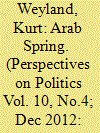

|
|
|
|
|
| Publication |
2012.
|
| Summary/Abstract |
Prominent scholars have highlighted important similarities between the Arab Spring of 2011 and the "revolutions" of 1848: Both waves of contention swept with dramatic speed across whole regions, but ended up yielding rather limited advances toward political liberalism and democracy. I seek to uncover the causal mechanisms that help account for these striking parallels. Drawing on my recent analysis of 1848, I argue that contention spread so quickly because many people in a wide range of countries drew rash inferences from the downfall of Tunisia's dictator. Applying cognitive heuristics that psychologists have documented, they overrated the significance of the Tunisian success, overestimated the similarities with the political situation in their own country, and jumped to the conclusion that they could successfully challenge their own autocrats. This precipitation prompted protests in many settings that actually were much less propitious; therefore problems abounded. Cognitive shortcuts held such sway because Arab societies were weakly organized and repressed and thus lacked leaders from whom common people could take authoritative cues. The decision whether to engage in emulative contention fell to ordinary citizens, who-due to limited information access and scarce experience-were especially susceptible to the simple inferences suggested by cognitive heuristics.
|
|
|
|
|
|
|
|
|
|
|
|
|
|
|
|
| 2 |
ID:
147236


|
|
|
|
|
| Summary/Abstract |
This article examines a neglected topic, the imposition of counterrevolution. Whereas revolution can sweep across whole regions like a tsunami, reaction tends to advance gradually, country by country. As these differences suggest, counterrevolution unfolds in a more deliberate and systematic fashion than revolution, which is fueled by the rash, ill-considered belief that the tsunami's trigger—the striking overthrow of a longstanding ruler by mass protest—is widely replicable. While reactionaries share this facile inference during the revolutionary upsurge, they engage in learning thereafter, rely less on problematic inferences, and resume more rational decision-making. Longstanding experience and practices of open debate and collective deliberation enable them to process information more thoroughly and calibrate their counterrevolutionary plans to domestic opportunities. Consequently, they succeed in reestablishing autocratic control step by step. By demonstrating how reactionaries recuperated their grasp of political reality during the upheavals of 1848, the article elucidates the differential patterns of rationality in politics.
|
|
|
|
|
|
|
|
|
|
|
|
|
|
|
|
| 3 |
ID:
090608
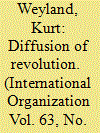

|
|
|
| 4 |
ID:
186265
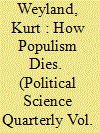

|
|
|
|
|
| Summary/Abstract |
KURT WEYLAND examines the weaknesses of populist leadership. He argues that populist leaders are prone to errors and misdeeds, have difficulty dealing with other political forces, and face institutional and external constraints. Consequently, he concludes, they damage and suffocate democracy not as easily and frequently as recent observers have feared.
|
|
|
|
|
|
|
|
|
|
|
|
|
|
|
|
| 5 |
ID:
105438
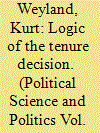

|
|
|
|
|
| Publication |
2011.
|
| Summary/Abstract |
Since tenure decisions concern the award of an employment guarantee, the burden of proof ought to rest on the candidate; in cases of doubt, the vote should be negative. However, a number of corrosive tendencies often weaken the strict application of this principle. To counteract these tendencies, this article advocates a strategy of pre-commitment to fairly objective standards and reliance on the professional judgments of a variety of anonymous outside experts, as reflected in a candidate's success in the double-blind peer review process.
|
|
|
|
|
|
|
|
|
|
|
|
|
|
|
|
| 6 |
ID:
172883


|
|
|
|
|
| Summary/Abstract |
How grave is the threat that populist leaders pose to democracy? To elucidate the prospects of the United States under president Donald Trump, I conduct a wide-ranging comparative analysis of populism’s regime impact in Europe and Latin America. The investigation finds that the risks have been overestimated. Populist leaders manage to suffocate democracy only when two crucial conditions coincide. First, institutional weakness, which comes in various types, creates vulnerabilities to populist power grabs. Second, even in weaker institutional settings populist leaders can only succeed with their illiberal machinations if acute yet resolvable crises or extraordinary bonanzas give them overwhelming support which enables them to override and dismantle institutional constraints to power concentration. Because none of these conditions prevail in the United States, an undemocratic involution is very unlikely. First, the federal system of checks and balances, rooted in an unusually rigid constitution, remains firm and stable. Second, President Trump encountered neither acute crises nor a huge windfall; consequently, his mass support has remained limited. Facing strong resistance from an energized opposition party and a vibrant civil society, the U.S. populist cannot destroy democracy. Instead, Trump’s transgressions of norms of civility have sparked an intense counter-mobilization that may inadvertently revitalize U.S. democracy.
|
|
|
|
|
|
|
|
|
|
|
|
|
|
|
|
| 7 |
ID:
165511


|
|
|
|
|
| Summary/Abstract |
External referee letters can, in principle, provide essential inputs for tenure and promotion decisions. But scholars’ reluctance to prepare critical, not to speak of “negative” assessments has led to a skewed self-selection: Potential referees tend to accept the task only if they see a tenure or promotion case as worthy of support. The resulting overabundance of praise has devalued the content of referee reports; they are difficult to interpret and of limited use for distinguishing deserving from undeserving candidates. Maybe a simple reform can mitigate these problems: Departments should pay external referees a generous honorarium, perhaps up to $2,000 at well-endowed research universities. This substantial incentive will induce more scholars to provide these assessments, thus counterbalancing the current self-selection on candidate supportability. Moreover, a large honorarium clearly turns the commissioning department into the contractual “principal” of these assessments, leading referees to prepare more searching, balanced evaluations. The main criterion will be whether a promotion really improves the department’s academic quality and scholarly standing.
|
|
|
|
|
|
|
|
|
|
|
|
|
|
|
|
| 8 |
ID:
067809


|
|
|
| 9 |
ID:
065240
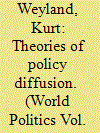

|
|
|
| 10 |
ID:
171283


|
|
|
|
|
| Summary/Abstract |
Book workshops are widely regarded as yielding important benefits for junior scholars; therefore, these intensive feedback sessions have proliferated in recent years. However, closer consideration suggests some important notes of caution. A wealth of additional suggestions does not necessarily improve a post-dissertation manuscript; instead, comments and criticisms advanced by senior experts may induce young authors to back away from or tone down innovative ideas or to address numerous additional factors and conditions, which can make their theory unwieldy and complicated. More important than the potential pitfalls for the first book itself are the heavy opportunity costs created by book workshops, which can jeopardize a junior colleague’s career advancement. After all, the substantial revisions arising from these feedback sessions take time away from article production and the design and initial research for a second major project. In these ways, overinvestment in the first book can hurt a young scholar’s chances at tenure time.
|
|
|
|
|
|
|
|
|
|
|
|
|
|
|
|
| 11 |
ID:
082615
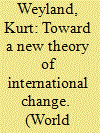

|
|
|
|
|
| Publication |
2008.
|
| Summary/Abstract |
Going beyond historical and rational choice institutionalism, this article elaborates the core of a new theory that can account for the discontinuous, disproportionate, and frequently wavelike nature of institutional change. Cognitive-psychological findings on shifts in actors' propensity for assuming risk help explain why periods of institutional stasis can be followed by dramatic breakthroughs as actors eventually respond to a growing problem load with efforts at bold transformation. And insights on boundedly rational learning explain why solutions to these problems often occur as emulation of other countries' innovations and experiences. The new approach, which elucidates both the demand and the supply side of institutional change, is illustrated through an analysis of the transformation of developmental states, welfare states, and political regimes.
|
|
|
|
|
|
|
|
|
|
|
|
|
|
|
|
| 12 |
ID:
186707


|
|
|
|
|
| Summary/Abstract |
Matias López and Juan Luna (2021) challenged my comparative analysis of populism’s threat to democracy, its reliance on institutional factors (coupled with conjunctural opportunities), and especially the inference about US democracy’s immunity to populist suffocation. However, their emphasis on structuralist and culturalist factors, which would suggest the vulnerability of the United States, is strikingly selective, theoretically unconvincing, and empirically problematic. López and Luna’s methodological improvement of my analysis does not alter the substantive findings or overturn my sanguine inference about US democracy’s likely resilience. Only their further modifications yield more pessimistic scenarios, but those adjustments stand on shaky theoretical and empirical ground. Indeed, the experiences of 2020–2021 corroborate my theory and its comparative lessons. The US institutional framework held firm and foiled the insistent attempts of President Trump and his most fervent followers to perpetuate the US populist in power. Consequently, US democracy continues to appear quite safe from populist strangulation.
|
|
|
|
|
|
|
|
|
|
|
|
|
|
|
|
|
|
|
|
|